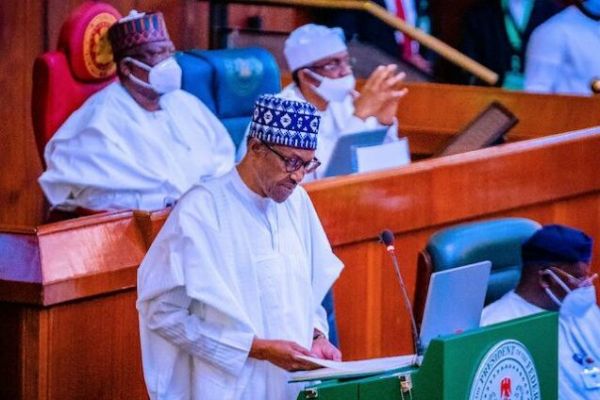….As FG mulls borrowing N8.80trn to finance deficit
By Marcus Ikechukwu
President Muhammadu Buhari on Friday disclosed that the total revenue available to fund the N20.51 trillion 2023 budget is just N9.73 trillion.
He added that the federal government plans to finance the deficit through new borrowings totalling N8.80 trillion.
These disclosures were contained in the 2023 budget presentation named “budget of fiscal consolidation and transition.”
According to the budget, oil price benchmark is pegged at 70 US Dollars per barrel; daily oil production estimate of 1.69 million barrels (inclusive of Condensates of 300,000 to 400,000 barrels per day) and exchange rate is pegged at 435.57 Naira per US Dollar. This is even as it was projected GDP growth rate of 3.75 percent and 17.16 percent inflation rate.
On the revenue estimates, President Buhari said, “based on these fiscal assumptions and parameters, total federally-collectible revenue is estimated at 16.87 trillion Naira in 2023.
He said total federally distributable revenue is estimated at 11.09 trillion Naira in 2023, while total revenue available to fund the 2023 Federal Budget is estimated at 9.73 trillion Naira. This includes the revenues of 63 Government-Owned Enterprises.
According to Buhari, oil revenue is projected at 1.92 trillion Naira, Non-oil taxes are estimated at 2.43 trillion Naira, Federal Government of Nigeria (FGN) Independent revenues are projected to be 2.21 trillion Naira. Other revenues total 762 billion Naira, while the retained revenues of the GOEs amount to N2.42 trillion Naira.
The President also noted that the 2023 Appropriation Bill aims to maintain the focus of MDAs on the revenue side of the budget and greater attention to internal revenue generation. Sustenance of revenue diversification strategy would further increase the non-oil revenue share of total revenues.”
On the planned 2033 expenditure, the President explained that “a total expenditure of 20.51 trillion Naira is proposed for the Federal Government in 2023. This includes 2.42 trillion Naira spending by Government-Owned Enterprises. The proposed 20.51 trillion Naira 2023 expenditure comprises.
The breakdown reads: “Statutory Transfers of N744.11 billion; Non-debt Recurrent Costs of N8.27 trillion; Personnel Costs of N4.99 trillion; Pensions, Gratuities and Retirees’ Benefits of N854.8 billion;
“Overheads of N1.11 trillion; Capital Expenditure of N5.35 trillion, including the capital component of Statutory Transfers; Debt Service of N6.31 trillion; and Sinking Fund of N247.73 billion to retire certain maturing bonds.”
On fiscal balance, the President further explained in the budget that, “we expect total fiscal operations of the Federal Government to result in a deficit of 10.78 trillion Naira. This represents 4.78 percent of estimated GDP, above the 3 percent threshold set by the Fiscal Responsibility Act 2007.
“As envisaged by the law, we need to exceed this threshold considering the need to continue to tackle the existential security challenges facing the country.
“We plan to finance the deficit mainly by new borrowings totalling 8.80 trillion Naira, 206.18 billion Naira from Privatization Proceeds and 1.77 trillion Naira drawdowns on bilateral/multilateral loans secured for specific development projects/programmes.”
Explaining how the government has been using loan to finance projects, the President said, “over time, we have resorted to borrowing to finance our fiscal gaps. We have been using loans to finance critical development projects and programmes aimed at further improving our economic environment and enhance the delivery of public services to our people.”
Blaming recession on the decline of revenue generating capacity of the country, President Buhari said, “as you are aware, we have witnessed two economic recessions within the period of this Administration. A direct result of this is the significant decline in our revenue generating capacity.
“In both cases, we had to spend our way out of recession, resulting in higher public debt and debt service. It is unlikely that our recovery from each of the two recessions would have been as fast without the sustained government expenditure funded by debt.”

Leave a Reply